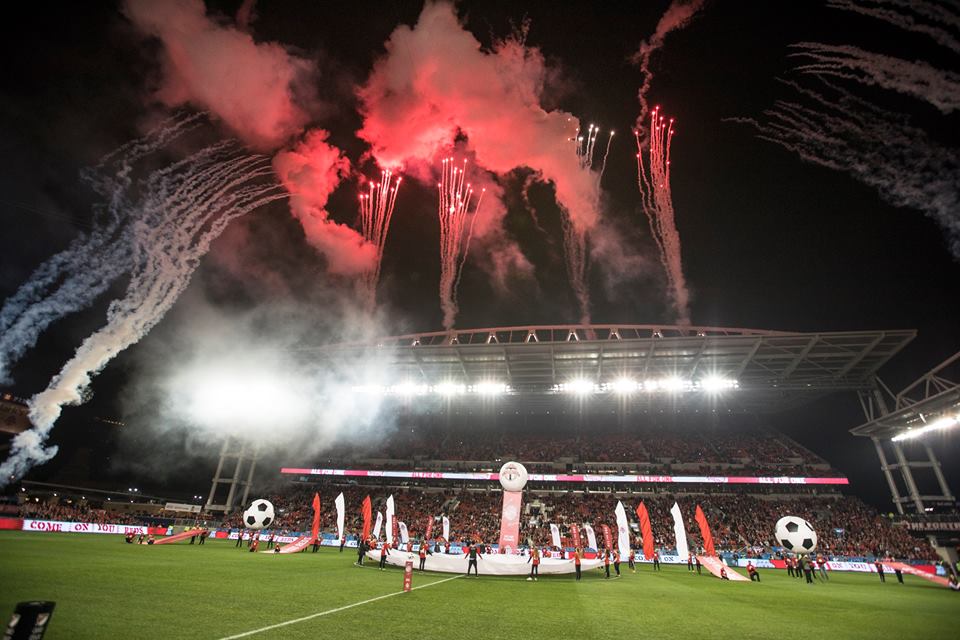Saturday’s MLS Cup Final could not only provide a thrilling conclusion to this season, but also showcase a growing Toronto FC fan base.
It is apparent that 2016 has been a strong year for Canadian soccer at the MLS level. Playoff matches between Toronto and the Montreal Impact drew strong ratings, and all three Canadian clubs—Toronto, Vancouver, and Montreal—finished among the top eight teams in per-game average attendance.
Of that trio, Toronto led the way, placing fourth with a per-game average of 26,583 fans. That was up from 2015’s average of 23,451. The total attendance at BMO Field, meanwhile, rose from 398,671 in 2015 to this year’s mark of 451,917.
The rise of Toronto FC has continued into the postseason. The reported attendance for the November 30 playoff match against Montreal was 36,000, a capacity crowd for the postseason, and that momentum will likely continue on Saturday. Tickets to Saturday’s MLS Cup Final sold out in three minutes after going on sale on Monday, making it one of the Toronto’s most sought-after sporting events in recent memory.
Toronto has had a strong soccer culture for decades, and the increasing embrace of the MLS coincides with a very successful period on the field for Toronto FC. In a city that has a strong sports scene, the enthusiasm for a potential MLS Cup makes sense. However, the passion for Toronto FC could reflect deeper trends in the city, as The Guardian recently explained:
Men’s soccer in Canada, however, is not the direct analogue of hockey, basketball, and baseball. It is arguably the sport with the greatest promise for the future, a sport that, in its domestic form, has yet to fully capture the public imagination. It is, however, the sport that Canadian children play. Since 1998 government surveys have indicated that more Canadians aged five to 14 play soccer than hockey. The gap has grown to the point where, in 2010, soccer was nearly twice as popular with the nation’s children. “Everybody I know played soccer,” says soccer journalist and Toronto FC supporter Sonja Cori Missio. “Obviously it doesn’t have the same sort of continual outlasting like you have in Italy or England.”
The MLS Cup final is therefore an opportunity to unite the disparate constituencies in the local soccer culture and establish life-long bonds. “The excitement of the two games and the amount of goals, I can’t imagine this won’t bring more people into the sport,” Toronto FC manager Greg Vanney said after the Eastern Conference final. Should that happen, the city’s many soccer communities might finally coalesce. “I hope that kids and players will start saying things like ‘I want to play for TFC’ instead of ‘I want to play for Arsenal, Barça, or Udinese’,” Missio says. “I want them to see TFC as a legitimate professional team like the Jays and Raptors.”
This MLS Cup Final should be a good time to showcase two of the stronger fan bases in the league, as Toronto’s opponent in the final is the Seattle Sounders FC. Since their inaugural season in 2009, the Sounders have been backed by some of the strongest supporter groups in the MLS while becoming a fixture atop the league’s annual attendance totals. Given the enthusiasm of their fan base, it stands reason that the Sounders could have some support in Toronto on Saturday, despite the distance between the two cities.
Regardless of where the MLS Cup goes on Saturday, it will be heading to a city with an enthusiac fan base. As game the game unfolds, however, it will be a strong reminder of how far Toronto FC’s support has come.
The MLS Cup Final will begin at 8:00 p.m. eastern, marking the first time the game will be televised during the Saturday primetime schedule. It will air on FOX, UniMás, TSN, and RDS.
Image courtesy Toronto FC.

